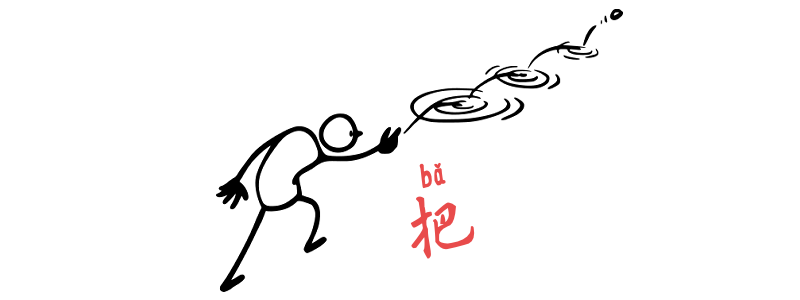Grammar Point:
There are 3 functions of 把 bǎ in Chinese. Determination, command, and doing a movement on something that makes a change to it.
If you’re not familiar with the basic foundation of 把 structure, I suggest reading the following articles first.
- 把 bǎ Part 1 (HSK 3)
- 把 bǎ Part 2 (HSK 4)
- 把 bǎ Part 3 (HSK 5)
Structure
Things + 把 + O + Verb + Something
這雙鞋把我的腳磨破了这双鞋把我的脚磨破了
These shoes have pinched my feet.
外面的聲音把我吵醒了外面的声音把我吵醒了
The sound outside woke me up.
他的行為把我氣炸了他的行为把我气炸了
His behavior made me so angry.
S + 把 + O + Verb + 得 + Degree
This 得 de is called a “degree complement” (程度补语 chéngdù bǔyǔ). It describes the degree or intensity of the verb or adjective.
他把大伙兒笑得肚子疼他把大伙儿笑得肚子疼
He made the group laugh so hard that their stomachs hurt.
他把爸爸氣得一夜沒睡他把爸爸气得一夜没睡
His father was so angry with him that he did not sleep all night.
孩子把媽媽感動得流下眼淚孩子把妈妈感动得流下眼泪
The child moved the mother to tears.
S + 把 + O1 + V作 + O2
Verbs in this structure are limited to: 当作 dāngzuò, 看作 kànzuò, 想作 xiǎngzuò, and 认作 rènzuò.
我的狗把我當作媽媽了我的狗把我当作妈妈了
My dog see me as mom.
你們把這當作自己家,放輕鬆點你们把这儿当作自己家,放轻松点儿
Treat this place as your own home and just relax.
我一直把我媽媽看作朋友,所以什麼事都會跟她討論我一直把我妈妈看作朋友,所以什么事都会跟她讨论
I always see my mother as a friend, so I will discuss everything with her.
別把我想作你的假想敵,我沒要跟你競爭别把我想作你的假想敌,我没要跟你竞争
Don’t take me as your rival. I’m not trying to compete with you.
FYI
In Chinese culture, the concept of “假想敌 jiǎxiǎngdí” or “imaginary enemy” has been present in various aspects of life, from military strategy to personal relationships. In traditional Chinese military tactics, the use of “假想敌” was common in training soldiers to think critically and anticipate potential enemies’ movements. This approach allowed soldiers to prepare for any scenario and react accordingly.
In modern Chinese society, the idea of an “imaginary enemy” has been used in a different context, such as in personal relationships. In some cases, people might view someone else as a rival or competitor, even if the other person is not intentionally trying to compete with them. In these situations, the person might use the concept of “假想敌” to remind themselves not to become overly competitive or view the other person as an adversary.
Practice
TouchHover over the space to see the answers.
✔️ Your words shattered my dreams.
你的話把我的夢想毀了你的话把我的夢想毁了
✔️ The world has been imagined by me as too idealistic.
我把世界想像得太美好我把世界想像得太美好
✔️ It turns out that you only see me as a money tree.
原來你只把我當作搖錢樹原来你只把我当作摇钱树
- Advanced 把 bǎ Part 5 (HSK 7-9)


